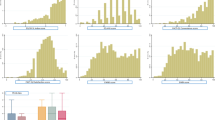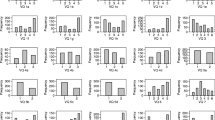Abstract
Purpose
To prospectively evaluate the psychometric properties of the Venous Insufficiency Epidemiological and Economic Study (VEINES-QOL/Sym) questionnaire, an instrument to measure disease-specific quality of life and symptoms in elderly patients with deep vein thrombosis (DVT), and to validate a German version of the questionnaire.
Methods
In a prospective multicenter cohort study of patients aged ≥65 years with acute venous thromboembolism, we used standard psychometric tests and criteria to evaluate the reliability, validity, and responsiveness of the VEINES-QOL/Sym in patients with acute symptomatic DVT. We also performed an exploratory factor analysis.
Results
Overall, 352 French- and German-speaking patients were enrolled (response rate of 87 %). Both language versions of the VEINES-QOL/Sym showed good acceptability (missing data, floor and ceiling effects), reliability (internal consistency, item-total and inter-item correlations), validity (convergent, discriminant, known-groups differences), and responsiveness to clinical change over time in elderly patients with DVT. The exploratory factor analysis of the VEINES-QOL/Sym suggested three underlying dimensions: limitations in daily activities, DVT-related symptoms, and psychological impact.
Conclusions
The VEINES-QOL/Sym questionnaire is a practical, reliable, valid, and responsive instrument to measure quality of life and symptoms in elderly patients with DVT and can be used with confidence in prospective studies to measure outcomes in such patients.

Similar content being viewed by others
References
Cohen, A. T., Agnelli, G., Anderson, F. A., Arcelus, J. I., Bergqvist, D., Brecht, J. G., et al. (2007). Venous thromboembolism (VTE) in Europe. The number of VTE events and associated morbidity and mortality. Thrombosis and Haemostasis, 98(4), 756–764.
Kahn, S. R., Ducruet, T., Lamping, D. L., Arsenault, L., Miron, M. J., Roussin, A., et al. (2005). Prospective evaluation of health-related quality of life in patients with deep venous thrombosis. Archives of Internal Medicine, 165(10), 1173–1178.
Kahn, S. R., & Ginsberg, J. S. (2004). Relationship between deep venous thrombosis and the postthrombotic syndrome. Archives of Internal Medicine, 164(1), 17–26.
Spencer, F. A., Gore, J. M., Lessard, D., Emery, C., Pacifico, L., Reed, G., et al. (2008). Venous thromboembolism in the elderly. A community-based perspective. Thrombosis and Haemostasis, 100(5), 780–788.
Beyth, R. J., Cohen, A. M., & Landefeld, C. S. (1995). Long-term outcomes of deep-vein thrombosis. Archives of Internal Medicine, 155(10), 1031–1037.
Koopman, M. M., Prandoni, P., Piovella, F., Ockelford, P. A., Brandjes, D. P., van der Meer, J., et al. (1996). Treatment of venous thrombosis with intravenous unfractionated heparin administered in the hospital as compared with subcutaneous low-molecular-weight heparin administered at home. The Tasman Study Group. New England Journal of Medicine, 334(11), 682–687.
Walters, S. J., Munro, J. F., & Brazier, J. E. (2001). Using the SF-36 with older adults: A cross-sectional community-based survey. Age and Ageing, 30(4), 337–343.
Kahn, S. R., Lamping, D. L., Ducruet, T., Arsenault, L., Miron, M. J., Roussin, A., et al. (2006). VEINES-QOL/Sym questionnaire was a reliable and valid disease-specific quality of life measure for deep venous thrombosis. Journal of Clinical Epidemiology, 59(10), 1049–1056.
Lamping, D. L., Schroter, S., Kurz, X., Kahn, S. R., & Abenhaim, L. (2003). Evaluation of outcomes in chronic venous disorders of the leg: Development of a scientifically rigorous, patient-reported measure of symptoms and quality of life. Journal of Vascular Surgery, 37(2), 410–419.
Ware, J. E., Jr, & Sherbourne, C. D. (1992). The MOS 36-item short-form health survey (SF-36). I. Conceptual framework and item selection. Medical Care, 30(6), 473–483.
Enden, T., Garratt, A. M., Klow, N. E., & Sandset, P. M. (2009). Assessing burden of illness following acute deep vein thrombosis: Data quality, reliability and validity of the Norwegian version of VEINES-QOL/Sym, a disease-specific questionnaire. Scandinavian Journal of Caring Sciences, 23(2), 369–374.
van der Velden, S. K., Biemans, A. A., Nijsten, T., & Sommer, A. (2014). Translation and validation of the Dutch VEINES-QOL/Sym in varicose vein patients. Phlebology, 29(4), 227–235. doi:10.1177/0268355513476279
Tuygun, A. K., Ketenci, B., Gunay, R., Gorur, A., Guney, M. R., Bicer, M., et al. (2012). Validity and reliability of VEINES-QOL/Sym questionnaire in chronic venous disorders. The Journal of Cardiovascular Surgery (Torino), 53(3), 355–361.
Beaton, D. E., Bombardier, C., Guillemin, F., & Ferraz, M. B. (2000). Guidelines for the process of cross-cultural adaptation of self-report measures. Spine (Phila Pa 1976), 25(24), 3186–3191.
Streiner, D. L., & Norman, G. (1995). Health measurement scales: A practical guide to their development and use (2nd ed.). Oxford: Oxford University Press.
Méan, M., Righini, M., Jaeger, K., Beer, H. J., Frauchiger, B., Osterwalder, J., et al. (2013). The Swiss cohort of elderly patients with venous thromboembolism (SWITCO65+): Rationale and methodology. Journal of Thrombosis and Thrombolysis, 36(4), 475–483.
McHorney, C. A., Ware, J. E., Jr, & Raczek, A. E. (1993). The MOS 36-Item Short-Form Health Survey (SF-36): II. Psychometric and clinical tests of validity in measuring physical and mental health constructs. Medical Care, 31(3), 247–263.
Ware, J. E., Jr. (2000). SF-36 health survey update. Spine (Phila Pa 1976), 25(24), 3130–3139.
Villalta, S., Bagatella, P., Piccioli, A., Lensing, A. W., Prins, M. H., & Prandoni, P. (1994). Assessment of validity and reproducibility of a clinical scale for the post-thrombotic syndrome [abstract]. Haemostasis, 24, 158a.
Terwee, C. B., Bot, S. D., de Boer, M. R., van der Windt, D. A., Knol, D. L., Dekker, J., et al. (2007). Quality criteria were proposed for measurement properties of health status questionnaires. Journal of Clinical Epidemiology, 60(1), 34–42.
de Vet, H. C., Ader, H. J., Terwee, C. B., & Pouwer, F. (2005). Are factor analytical techniques used appropriately in the validation of health status questionnaires? A systematic review on the quality of factor analysis of the SF-36. Quality of Life Research, 14(5), 1203–1224.
Guyatt, G. H., Deyo, R. A., Charlson, M., Levine, M. N., & Mitchell, A. (1989). Responsiveness and validity in health status measurement: A clarification. Journal of Clinical Epidemiology, 42(5), 403–408.
van Korlaar, I. M., Vossen, C. Y., Rosendaal, F. R., Bovill, E. G., Cushman, M., Naud, S., et al. (2004). The impact of venous thrombosis on quality of life. Thrombosis Research, 114(1), 11–18.
Hedner, E., Carlsson, J., Kulich, K. R., Stigendal, L., Ingelgard, A., & Wiklund, I. (2004). An instrument for measuring health-related quality of life in patients with Deep Venous Thrombosis (DVT): Development and validation of Deep Venous Thrombosis Quality of Life (DVTQOL) questionnaire. Health and Quality of Life Outcomes, 2, 30.
Hudgens, S. A., Cella, D., Caprini, C. A., & Caprini, J. A. (2003). Deep vein thrombosis: Validation of a patient-reported leg symptom index. Health and Quality of Life Outcomes, 1, 76.
Hayes, V., Morris, J., Wolfe, C., & Morgan, M. (1995). The SF-36 health survey questionnaire: Is it suitable for use with older adults? Age and Ageing, 24(2), 120–125.
McMurdo, M. E., Roberts, H., Parker, S., Wyatt, N., May, H., Goodman, C., et al. (2011). Improving recruitment of older people to research through good practice. Age and Ageing, 40(6), 659–665.
Acknowledgments
This study was supported by Swiss National Science Foundation Grant 33CSCO-122659/139470. We thank all the investigators and the study personnel who made the SWITCO65+ study possible (in particular, Marc Righini, Kurt Jaeger, Hans-Jürg Beer, Beat Frauchiger, Joseph Osterwalder, Nils Kucher, Bernhard Lämmle, Jacques Cornuz, Anne Angelillo-Scherrer, Nicolas Rodondi, Sven Trelle, Christian M. Matter, Marc Husmann, Martin Banyai, Markus Aschwanden, Michael Egloff, Lucia Mazzolai, Olivier Hugli, and Henri Bounameaux).
Conflict of interest
The authors have no conflict of interest.
Author information
Authors and Affiliations
Corresponding author
Electronic supplementary material
Below is the link to the electronic supplementary material.
Rights and permissions
About this article
Cite this article
Méan, M., Limacher, A., Kahn, S.R. et al. The VEINES-QOL/Sym questionnaire is a reliable and valid disease-specific quality of life measure for deep vein thrombosis in elderly patients. Qual Life Res 23, 2463–2471 (2014). https://doi.org/10.1007/s11136-014-0704-x
Accepted:
Published:
Issue Date:
DOI: https://doi.org/10.1007/s11136-014-0704-x




